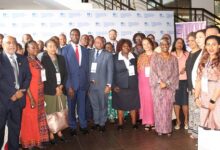A total of 273 students graduated from the KAAF University College in Accra last Friday at the institution’s 10th congregation.
Of the number, 152, representing 56 per cent, studied Science, Technology, Engineering and Mathematics (STEM) programmes with the remaining 121, representing 44 per cent, from humanities.
The virtual event was on the theme “Partnership with private tertiary institutions: A pathway to expanding access to high-quality STEM education.”
Participants included representatives of KAAF’s mentor institutions; Kwame Nkrumah University of Science and Technology, University for Development Studies and Ghana Institute of Management and Public Administration.
Addressing the gathering, Prof. Kwame BoasiakoOmane-Antwi, Chairman, Governing Council of the University College, said in spite of the higher-than-average-cost for commencing and sustaining STEM programmes, the KAAF-Agenda to train the youth in “Job-Ready” programme had remained a primary focus.
He said despite the devastating effect of the global pandemic on schools, KAAF University College had stayed committed to the generation of knowledge in STEM as well as humanities for the development of the critical human capital for economic growth and development.
While expressing happiness about the number of STEM graduates being churned out of the university college, he forecasted that by the time the departments of Midwifery, Community Health Nursing, Medical Laboratory, and other new STEM programmes started presenting graduands, the Sciences to Humanities ratio would be consistent with the envisaged policy target of 60:40 in tertiary institutions in the country.
He said STEM teaching and learning went beyond the mere transfer of knowledge and engages students and equips them with critical thinking, problem solving, creative and collaborative skills, and ultimately establishes
connections between the school, workplace, community and the global economy.
He noted that STEM education improved technological literacy, leads to the next generation of business leaders and innovators, adding that Africa’s long-term economic prospects are being constrained by severe skills shortages in many vital sectors.
“STEM is the major area that requires immediate attention. If Africa, Ghana, not an exception, does not start building capacity in STEM, its progress towards achieving sustainable and comprehensive growth will be
severely challenged,” he said.
BY TIMES REPORTER







